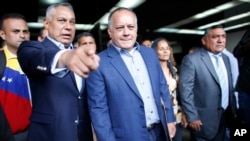Venezuela's high court issued an arrest order for the ousted chief prosecutor's husband Thursday after authorities accused him of running a $6 million extortion ring, a ruling promptly denounced by government critics as a move aimed at silencing opponents of President Nicolas Maduro.
The government-stacked Supreme Court also announced it was referring German Ferrer's case to the new, all-powerful constitutional assembly. The assembly was installed in early August at Maduro's behest following a widely criticized vote, and it is expected to proceed with lifting Ferrer's immunity from prosecution that comes with legislative office.
Ferrer is a lawmaker formerly aligned with Maduro's administration who has stood by his wife, Luisa Ortega Diaz, in denouncing the assembly's creation.
Ferrer denies signing papers
In a written statement to local media, Ferrer denied signing documents that officials are holding up as evidence he opened a bank account in the Bahamas to facilitate transactions.
“This government no longer has any limits or shame,” he wrote.
Tarek William Saab, who was named by the constitutional assembly to replace Ortega Diaz as chief prosecutor, said Wednesday that the alleged criminal ring extorted money from people including businessmen in the nation's oil industry in return for protecting them from prosecution.
Ruling socialist party leader Diosdado Cabello provided prosecutors with papers allegedly showing that Ferrer and others opened six bank accounts at the Bahamas branch of a Swiss bank.
'Don't pass muster'
In his statement, Ferrer said the documents “don't pass muster.”
Cabello's involvement in the case led many to conclude it is politically motivated. Opposition lawmaker Henry Allup questioned the timing of the charges, asking why they appeared so soon after Ferrer broke publicly with Maduro's government.
“This is a way to intimidate,” he said.
Ferrer and Ortega's whereabouts Thursday were not clear. Authorities raided their home the previous day.
The constitutional assembly, which is tasked with rewriting the nation's charter and trumps all other branches of government, has been condemned by dozens of foreign nations which refuse to recognize it.
Maduro did not hold a referendum asking Venezuelans to approve the formation of the assembly, instead going directly to the National Electoral Council to schedule a vote for its members that was boycotted by the opposition.
Smartmatic questions government numbers
International voting technology firm Smartmatic, which provided the voting machines for the election, announced shortly after the vote that the government's official turnout count was off by at least 1 million.
The government-stacked electoral council is now proceeding with regional elections scheduled for October.
Council president Tibisay Lucena announced Wednesday that the government was breaking with Smartmatic for future elections.




